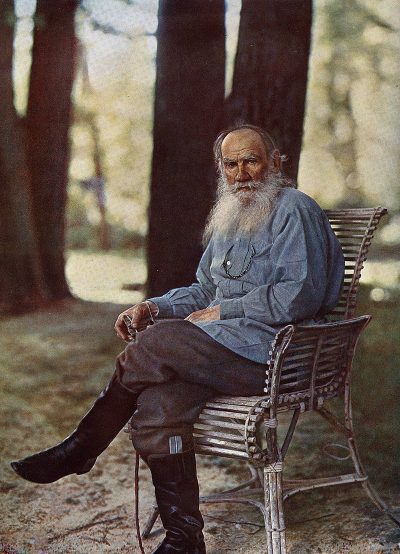Tolstoy’s Speech Against War: “Thou shalt not kill!”

All Global Research articles can be read in 51 languages by activating the Translate Website button below the author’s name (only available in desktop version).
To receive Global Research’s Daily Newsletter (selected articles), click here.
Click the share button above to email/forward this article to your friends and colleagues. Follow us on Instagram and Twitter and subscribe to our Telegram Channel. Feel free to repost and share widely Global Research articles.
***
“2023 has been a challenge for Global Research, but we know 2024 will be no different. That’s why we need your support. Will you make a New Year donation to help us continue with our work?”
*
Introduction
In 1909, the Russian writer Lev Nikolayevich Count Tolstoy (1828-1910), a representative of non-violent resistance, gave a speech against war at the age of 80 (1).
As this speech is still highly topical today, at the turn of the year 2023/2024 – including the deliberate reduction of the world’s population through the COVID mRNA vaccine – some of the speeches are reproduced verbatim below. They all revolve around the clear, universally recognised truth, which is binding for all people, “that man cannot or must not kill another under any circumstances and under no pretext whatsoever” (2).
“Speech Against the War”
“Beloved brothers! We have gathered here to fight against war. (…).
In their hands (the hands of the rulers, R. H.) there are billions of money, millions of willing soldiers, in our hands there is only one means, but the most important means in the world – the truth. And therefore, however small our forces may seem in comparison with the forces of our opponents, our victory is as certain as the victory of the light of the rising sun over the darkness of the night.
Our victory is certain, but only on one condition – on the condition that we proclaim the truth and state it unreservedly, without any digression, without any concession, without any mitigation. This truth is so simple, so clear, so plausible, so binding not only for Christians but for every sensible person that it only needs to be proclaimed in its full meaning so that people can no longer go against it.
This truth is contained in its full meaning in what was said thousands of years before us in four words in the law that we call the law of God: Thou shalt not kill! This truth says that man cannot or must not kill another under any circumstances and under no pretence whatsoever. (…).
I would therefore like to propose to our Assembly that we write and publish an appeal to the people of all nations, especially Christian nations, in which we state clearly and straightforwardly what everyone knows but no one or almost no one says: Namely, that war is not, as men now pretend, a particularly valiant and praiseworthy cause, but that it is, like all murder, an abominable and sacrilegious act, not only for those who choose the military career of their own free will, but also for all those who devote themselves to it for fear of punishment or for the sake of selfish interests. (…).
We must say what everyone knows and only dare not say, we must say that no matter how different a name people give to murder, murder always remains murder – a sacrilegious, disgraceful act. (…). They will cease to see in war the service of the fatherland, heroism, the glory of war, patriotism, and will see what is there: the naked, sacrilegious act of murder. (…).
Those who practise sacrilege will be ashamed, but those who have persuaded themselves that they see no sacrilege in murder will now realise it, and will cease to be murderers. (…).
That is all I wanted to say. I would be very sorry if I had offended, insulted or aroused evil feelings in anyone. But it would be a disgrace for me, an old man of 80 years, who is liable to die at any moment, not to speak quite openly the truth as I understand it, the truth which I firmly believe is the only thing that can save mankind from the unfortunate tribulations that war produces and from which it suffers.” (3)
*
Note to readers: Please click the share button above. Follow us on Instagram and Twitter and subscribe to our Telegram Channel. Feel free to repost and share widely Global Research articles.
Dr Rudolf Lothar Hänsel is a school rector, educationalist and qualified psychologist. After his university studies, he became an academic teacher in adult education. As a pensioner, he worked as a psychotherapist in his own practice. In his books and specialist articles, he calls for a conscious ethical and moral education of values as well as an education for public spirit and peace. He is a regular contributor to Global Research.
Notes
(1) Tolstoy, Leo N. (1968). Speech against the war. Political pamphlets. Frankfurt am Main
(2) A. l. c., p. 164
(3) A. a. O., p. 163ff.

